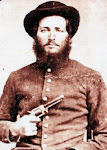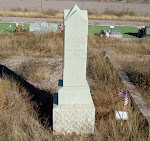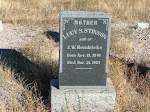[As compiled by his Great Granddaughter, Reva Tupen]
"I hesitate to write about great grandfather Hendricks because we really know so little about him. On the other hand, if what is now known is not recorded, that too will soon be lost to memory. Following is the best record available at this time and has been gleaned from older members of the family as well as research in public and private records.
According to my grandmother, Amanda Catherine Hendricks, rural 19th century Kentucky was a beautiful place. Numerous creeks and waterways kept it green and growing and it still retained much of its primitive beauty. Nut and fruit trees of many varieties grew wild. In her opinion, the Garden of Eden must have been like that. However, the economy left something to be desired. Our people were farmers and it required many hours of hard labor to wrest a living from the soil by methods we would now consider quite primitive. Families supplied most of their own needs, raised their food, spun, wove and sewed or knit their clothing from wool supplied by their own sheep, made soap, candles, etc.
This is the setting into which our great grandfather, James William Hendricks, (Jimmie to his family) was born on 15 April 1836. The home of his parents, James and Elizabeth (Whitaker) Hendricks, appears to have been located on Drakes Creek near the little town of Franklin in Simpson County, Kentucky.
Little is known of the father, James Hendricks. According to some sources he was a native of Kentucky. Other records state he was from Tennessee. Elizabeth Whitaker came to Kentucky as a small child with her parents, Thomas and Mary (Coon) Whitaker from Rowan County, North Carolina.
No record has been found of the marriage of James Hendricks and Elizabeth Whitaker. It probably took place about 1825-1828. Their son, Joseph, was born 9 August 1829. The other children, as listed in family records, were John, Susan Jane, Wylie Jones, born about 1837, Sarah Margaret, Mary Catherine, David R. and McHenry.
Elizabeth appears on the tax records in 1844 indicating she was a widow. According to family tradition her husband, James, ran rafts down the river to Tennessee. He had gone with a load of produce when one night Elizabeth heard his team, went to the window and saw him coming down the road but when she went out to open the gate for him, there was no one. He never returned, but she felt this was a manifestation to her that his absence was not voluntary. However, it is not known for sure whether he was the victim of foul play, became ill and died, or simply deserted his family.
It was the general practice for fatherless children to be “bound out,” mothers generally having no choice in the matter. This was a legal procedure by which the child was under the custody and control of a substantial citizen. The court specified the conditions, i.e., the trade to be learned, education if any, and duration (usually until a boy reached the age of 21). Settlement at the end of the period could be a horse, saddle and bridle, the value specified. Sometimes a new suit of clothes was included, etc.
Jimmie Hendricks was “bound out” at an early age, probably about the time he was eight years old, to David Huffiness, for in the 1850 census of Simpson County we find a James Hendricks, age 13, listed with this family. Huffiness was a farmer and Jimmie learned the business of farming. He never learned to read and write and always signed his name with an X. However, he did calculate, was a shrewd businessman and was never “out foxed” in a business deal.
In the 1860 census of Simpson County we find James, age 23, living with his mother and the other children, except Joseph and John who were older. The family was very poor. Jimmie and his brother sometimes plowed all day for twenty-five cents.
By 1861 the clouds of war were dark over Kentucky. The following are extracts from a letter written from Logan County, Kentucky, 2 August 1862 by Elizabeth (Whitaker) Thompson and her husband, William Thompson, to their brother Ephraim Henry Whitaker in Point Douglas, Minnesota. The words are written exactly as they were in the letters, misspelled words, etc., are the same as the spelling in the original letters):
“There has a great many important things transpired in our government, a home Revolution with all its terrors has spred its dark curtain over our wonce happy land its terrific influence has caused a great deal of trouble in our country and the people has become divided and thereby destroyed the friendship of not only the state but neighborhoods. Some declared themselves in favor of the so-called Southern Confederacy while the balance for the union. This thing in itself causes a coldness between friends and neighbors and even between persons of the same family this state of course is bad but still worse, the immense loss of life occasioned by camp life caused by contageous deseases the destruction on the battlefield all this together looks like we are to be almost if quite exterminated, not taking into consideration the vast amount of suffering occasioned by the rebellion. It will leave many widows and orphans on the lap of this unfriendly world and very many of them will be doomed to suffer for the nessacerys of life and to add to this calamity our country is infested with guerilla bands whose burning is to steal and pilfer all they can and kill all who resist their thieving operations. Upon mature consideration, I think we are ruined people and that without a remedy.”
“The connecion some of them have volunteered and gone into the united states services. Old brother Jesse Whitaker, Brother Richmond Whitaker, Brother Willis Whitaker, he is the youngest one of the last children, Brother George’s oldest son Abraham Whitaker. They were all allive at the last accounts. Jesse is at home at present he has been in hospital with rheumatism and dispepsy. Richmond is reported to be sick and sent to some hospital but we have not learnt whare. Willis and George’s son was well at last accounts. Our Country town, Russelville, is a perfect sink of the darker die with the foulest grade. The place is now under guard.”
Conditions being what they were and the eminent induction of her boys into the service, it appears that Elizabeth and her children determined to move from their home near Franklin, Simpson County, to Logan County near the Muhlenberg County Line to be near her family, the Whitakers, as indicated by the following extract from the same letter cited above:
“Sister Elizabeth Hendricks is still living in Simpson county but will move down in a few days. Three of her boys, Joseph, James and Wiley has been down here ever since early this spring. Joseph and James has made a crop here this summer.”
Joseph entered the service 10 August 1862 in Co. K, 8 Ky. Cavalry. Wiley mustered in 6 September 1862 as a private in Capt. Hudspith’s Co., 8 Reg., Ky. Cavalry and James a year later, 10 September 1863, private in Capt. George W. Hay’s Co. D, 52 Regiment, Ky. Mounted Infantry. He wasn’t really a fighting man. Years later a grandchild asked if he shot anyone in the war. His reply was, “Not to my knowledge.”
During the first winter, while on a scouting expedition at night, his horse ran against a snag with him and injured his left leg below the knee. It did not appear at the time to be very badly hurt but later broke out in blisters and commenced “eating in and spreading.” He served at Franklin, Irvine and Mount Sterling where he was captured by John H. Morgan and kept four and a half days. He “contracted fever from exposure” and was sent to the hospital in Bowling Green where he remained for 25 days, then rejoined his regiment in Hopkinsville, Ky. There he went into the field hospital as a nurse. It was here that his injured leg really began to give him trouble. It never healed. Each day the remainder of his life, it had to be salved and bandaged. Because of it, he was unable to do heavy farm work such as clearing the land and making rails.
The war left many people in Kentucky financially devastated. For example (Extract from a letter from Richmond Whitaker, James Wm. Hendricks’ uncle, in Hopkinsville, Logan County, Ky. to his brother in Point Douglas, Minn.): “I searved 3 years in the Sirvest I was well to do when the ware commenced but when I came out I was worse than nothing. I lost all together 8 and 9 thousand dollars. My children was small and my wife had to sell furniture and bed clothes to live until I was out. I lost everything I had. Brother, you may imagine how it hirt for a man to live at the top of the Pot and then fall Right at wonce and siping the very Drugt of the Same Pot, if you can you can simathse with me.”
Some time about this period, Jimmie married Elsie Finn. She was probably from Simpson County as a number of Finn families were living there. There are no known children by this marriage. After her death he married, 6 January 1857, Lucy Susan Stinson, daughter of Archibald and Elizabeth (Smothers) Stinson, at Elkton, Todd County, Kentucky. They set up housekeeping in Clifty, Todd County, but moved to Baughs Station, Logan County, about 1872. Then in 1875 they traded their 169-acre farm on Clifty Creek in Logan County for 175 acres on Muddy River near Huntsville, Butler County. To them were born 14 children - Nancy Elizabeth, Arminda Alice, Amanda Catherine, Willa Belle, David Carlee, Joanna, Martha Susan, James Balus, Dora Edith, Charles McHenry, George Washington, Archibald, Ollie and Olin. Only eight grew to maturity. David Carle, Dora Edith, George Washington, Archibald, Ollie and Olin all died in infancy.
Lucy was the youngest of a large family. Her father had died shortly before her marriage. Her mother was old and blind so made her home with the young couple. Their home was small and congested as children came along. Sleeping accommodations were crowded and “doubling up” was necessary. A child slept at the foot of grandma’s bed. This kept her feet warm in winter.
Fortunately, Jimmie was patient with his aged and ailing mother-in-law. To her oft repeated, petulant inquiry, “Jimmie, did you feed and water the animals?” when she heard them restless at night. He always answered kindly, “Yes, I fed and watered them.”
In 1882 Mormon missionaries John W. Taylor and Jacob G. Bigler came to their community preaching the Gospel. Teaching Lucy and the girls was not difficult, but James was another matter. It was spring and time to plow the fields. James didn’t have time to listen; he had work to do that couldn’t wait. But Mormon missionaries can be ingenious. They devised a plan whereby they took turns plowing for James while the other taught him the Gospel of Jesus Christ.
The result was that James, Lucy and their daughters Arminda Alice, Amanda Catherine and Willa Belle were baptized into the Church of Jesus Christ of Latter Day Saints on 17 April 1882. This step made a great change in their lives. For one thing, they wished to join the Saints in the west. For another, Mormons were not well accepted in the community and were looked down upon. One fellow, who had worked for James for some time, considered it beneath his dignity to work for a Mormon. That is, he refused to work for him until he found he could not find work elsewhere.
In preparation for the trip west, the farm was sold but it was necessary to remain in Kentucky until full payment had been received. During this period he worked out as opportunity afforded. One thing that he refused to do, however, was to work in the mines, saying, “I’ll be underground soon enough.” Grandma Stinson, Lucy’s mother, decided not to go west with them (a decision which she later regretted) and went to live with one of her sons.
Finally, 14 June 1885, the family boarded the train for Arizona to join a group of L.D.S. settlers there. Lucy and the older girls had worked several days cooking a huge basket of food to supply the family’s needs during the trip. As they were traveling through Texas, a group of “rowdy” men got on the train and took over the car where the Hendricks family was sitting. Fearing for the safety of his daughters, James took his family to another car until the “rowdies” left the train. When they returned to their own seats they found all the food gone! The men had eaten everything! So he had to get off at the next station and buy what food he could for his family.
Upon arrival in Arizona they were warmly greeted by Jacob Bigler, one of the elders who had converted them, who took them to his home in Central, Arizona. They stayed with the Biglers several days while they decided exactly what to do. Hot, arid Arizona, one of the last frontiers, was a sharp contrast to their native Kentucky. Nevertheless, they set about making a new life for themselves, settling in Thatcher, Graham County, and sharing the hardships of the early settlement. There were not more than eight or nine families there at the time.
James took up a 160-acre homestead and later purchased another 160 acres from a disenchanted homesteader. He bought the first shingled roof and lumber floor house in the community, the rest having dirt floors and roofs. His eldest daughter, Nancy, at the age of seventeen and with an eighth grade education, became the first schoolteacher in Thatcher. She didn’t pretend to be a teacher, but they needed her in order to establish a school district. As there was no house available to hold classes, an old stockade that had been built for a chicken coop was cleaned out. It had a dirt floor and a dirt roof. Benches made of rough 1 x 6 lumber were installed and that was their schoolhouse.
The Hendricks’ were members of the Thatcher Ward, St. Joseph Stake. Upon arrival, local church leaders felt they should be baptized into the Ward. Other members of the family complied but James refused, insisting he had been baptized once and that was sufficient. He lived by his convictions and was an honest hard working man. He did not believe in card playing and refused to have a deck of cards in his house - that is, if he knew it. However, this did not prevent his sons from spending many an afternoon playing cards while their father and mother went to town, some distance by horse and wagon.
Sometime between 1890 and 1895 he ran a general merchandise store in Pima a few miles from Thatcher but, preferring farming, he soon gave up the store and devoted all his time to farming. As his daughters married, though he would rather have had them remain single, he gave each 20 acres of land, a cow, a hive of bees and other necessities for starting married life, except Willa Belle who received 40 acres because her land was not as good as that of her sisters. The balance of his property he divided between his two boys who were the youngest of his surviving children.
As a young man, James William Hendricks stood 5'11", was dark complexioned with black eyes and dark hair and beard which in later life turned to gray. He was kind, gentle and considerate, justifiably much loved by his grandchildren who he was wont to humor. Typical was the occasion three grandchildren, Katie, Mamie (Mary Susan) and Artie (Artemesia) Price were staying at his home. Artie, the youngest, insisted upon sitting on a certain box to eat. One evening it was late and dark when he came in from work for the evening meal. As they gathered around the table, it was found that Artie’s box was missing. She would not consider a substitute so Grandpa, tired and hungry though he was, went out some distance to the barn to find the missing box.
Not only was he considerate of his family and associates, but of all creatures. His daughter, Alice, recalled that the most severe discipline she received was for tying a string to a June bug and allowing it to become entangled in tree branches.
On 3 February 1908, this much loved grandfather died of “heart failure due to debility” at Franklin, Graham County, Arizona where they had moved sometime before his death, and he is buried there."




1 comment:
Love your story on James Hendricks who married Elizabeth Whitaker. We have been trying to prove or disprove info on the James Hendricks who married Elizabeth Whitaker. Did he have a middle initial? do you know approximately when he was born? You might consider trying to find a male Hendricks relative to participate in the Hendricks dna project. We have a James A. Hendricks b. abt 1793 NC whose family lived in KY then he moved on to Missouri and was never enumerated with a wife and children. Joel H. Hutto - Dripping Springs TX - joelhutto@aol.com
Post a Comment